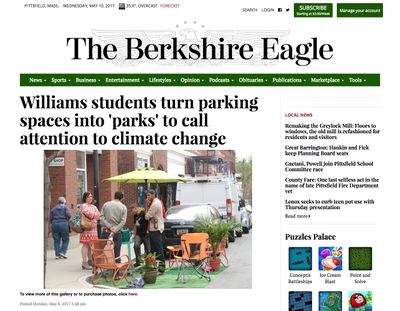Williams students turn parking spaces into 'parks' to call attention to climate change

Sebuah artikel berjudul "Williams students turn parking spaces into 'parks' to call attention to climate change" yang dimuat di The Berkshire Eagle (Pittsfield, Mass.) Artikel ini ditulis oleh Adam Shanks pada Tanggal 8 Mei 2017 dan disalin ulang oleh "Wawies" Wisnu Wisdantio pada 10 Mei 2017.
Isi Artikel
WILLIAMSTOWN — Want to combat climate change?
Kick up your feet and relax in a beach chair. At least, that was the approach on Thursday of a group of Williams College students.
In an effort to discourage residents from driving into Spring Street when they could instead walk or bike, Williams College students took over a few downtown parking spaces and converted them into parks.
In a year-long collaboration between the Williams College Museum of Art and the Ghana ThinkTank organization, students worked to provide a third-world solution to a first world solution.
Working over the past year with the Ghana ThinkTank, an organization that reaches out to developing countries for wisdom and guidance on solving first-world issues, to identify how climate change impacts people in Williamstown and identify solutions.
Williams students worked with think tanks in Morocco and Indonesia to form solutions to climate change issues, one of which took the form of parks in parking spaces.
The Indonesian and Moroccan collaborators visited Williamstown in March and have been in contact via social media throughout the process.
In this case, the problem identified was the number of town residents who opt to drive into town, despite the small contribution each trip makes to climate change.
By flipping the traditional dynamic of a first-world country offering solutions to a third-world country, students learned about the concept of "mampir" from their counterparts in Indonesia. The term is the Javanese philosophy of walking and paying a visit with those you encounter.
"Pause and talk," said Sonnet Coggins, associate director for academic and public engagement at the Williams College Museum of Art.
To embody this concept, the students didn't just stand in a few parking spaces on Thursday; they attempted to address the larger cultural issues that lead Americans to choose a car before their own feet.
"You want to get from point A to point B as quickly as possible," said Crispin Jay Salapare, a Williams freshman who was part of the "action team" formed for the project.
Instead, the team set up fake turf, lawn furniture, umbrellas and plants to encourage passersby to stop and relax.
"We wanted to make these parks into social magnets," Salapare said.
The hope is that by making travel less about getting to the destination as quickly as possible and more about the journey itself, more town residents will opt to walk and avoid contributing to global warming.
"As a person, you may say `my impact is negligible,'" Salapare said. "You can do your part. There are ways to address climate change that you can approach."
The project team also dedicated one of its parking spaces to finding ways to help those who accept climate change as scientific reality communicate to those who don't on a level they will connect with.
One example, aimed at those who advocate for free market, is "tax carbon, not innovation."
"We're trying to help people like me learn how to speak about climate change with people who have very different beliefs than us," said Christopher Robbins, an artist with the Ghana ThinkTank. "We've aligned their arguments with climate change."